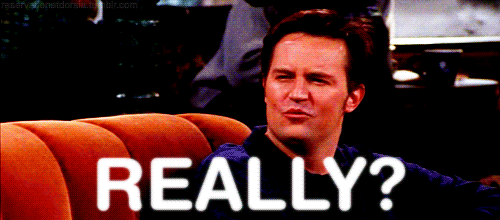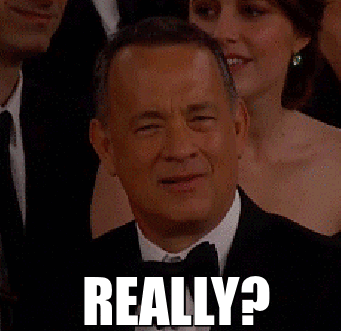I Was Really Good - The True Impact Of Genuine Ability
There are moments in life, you know, when a simple statement holds so much weight, a feeling of deep satisfaction that settles in your chest. It's that quiet confidence, perhaps, or the loud cheer of recognition, when you can truly look back and say, "I was really good." This isn't about boasting, not at all; it's about acknowledging a time when your efforts, your dedication, and your skills truly aligned to produce something remarkable, something that stood out from the rest. It's a personal truth, a moment of genuine accomplishment that resonates deeply within you.
This kind of statement, you see, carries a particular kind of resonance. It speaks to a level of performance that goes beyond just being competent or adequate. It points to a period, a project, or a specific task where your contribution was, well, simply outstanding. People remember those times, too; they recall the way you handled a tricky situation or the quality of the work you put forth. It's a feeling that stays with you, a source of quiet pride that you can always draw upon, like your own little wellspring of past triumphs. It's a pretty powerful thing, really, to hold onto that sense of having truly excelled.
And what makes that phrase – "I was really good" – so powerful? It's the little word nestled right in the middle, isn't it? That small addition, "really," changes everything. It takes a simple claim of goodness and elevates it, giving it a depth of meaning that a mere "I was good" just can't quite capture. It's about the genuine nature of that goodness, the undeniable truth of it, and the impact it had. This simple word, actually, holds a key to how we communicate genuine sentiment and true assessment, making our statements about ability far more impactful and believable.
- Why Are Old People So Stupid
- Kate Spade Puzzle
- Amber Lancaster Divorce
- Little Red Wagon Miranda Lambert
- Kirk Hammett Wife
Table of Contents
- The Story of Alex – When "I Was Really Good" Mattered
- What Does It Mean to Say "I Was Really Good"?
- How Do We Know When Someone Is Truly "Really Good"?
- Why Does "Really" Carry Such Weight?
- Can We Misunderstand "I Was Really Good"?
- Where Does "I Was Really Good" Find Its Place in Everyday Talk?
- What Happens When "I Was Really Good" Is Spoken?
The Story of Alex – When "I Was Really Good" Mattered
Let's consider Alex, for instance. Alex isn't a famous person, not in the way you might think of a celebrity, but in their own circle, their work spoke volumes. Alex spent years dedicated to creating something quite special for their community, something that required a deep understanding of people and a knack for bringing ideas to life. There was a time, you know, when a big project came up, one that seemed almost too big to handle. Many folks were hesitant, feeling a bit overwhelmed by the scope of it all. Alex, however, stepped forward with a quiet determination, seeing not just the obstacles but also the possibilities, and honestly, they just got to work.
During that time, Alex poured every ounce of their creative energy and practical skill into the task. They spent countless hours refining concepts, listening to feedback from others, and making sure every small detail was just right. It wasn't always easy, of course; there were late nights and early mornings, and a few moments of doubt crept in. But Alex kept pushing, driven by a clear vision and a genuine desire to make a difference. The outcome, as a matter of fact, was something truly remarkable, something that far exceeded everyone's initial hopes. When it was all finished, and the community saw the results, there was a collective gasp of appreciation, a shared sense that something truly exceptional had been accomplished. It was then that Alex, looking at the finished product, could truly say, "I was really good" at that particular endeavor.
Personal Details of Someone Who Was Really Good
| Attribute | Detail |
|---|---|
| Name | Alex (Fictional Persona) |
| Primary Skill | Community Project Development |
| Key Strengths | Creative problem-solving, attention to detail, persistence, collaborative spirit |
| Defining Moment | Leading a complex community initiative to overwhelming success |
| Impact | Inspired others, created lasting positive change, earned deep respect |
| Personal Motto | "Give your best, always." |
What Does It Mean to Say "I Was Really Good"?
So, what exactly are we getting at when someone says, "I was really good"? It's more than just a simple statement of past competence, you see. It implies a level of performance that went beyond the expected, a period where one's abilities were fully realized and put to excellent use. When we use that word, "really," we're expressing a truth, a factual account of something that genuinely occurred. It's about how something existed in reality, how it truly was, rather than just a casual observation. It suggests a profound level of skill or effectiveness that was undeniably present during a particular time. For Alex, that meant their project wasn't just okay; it was, in fact, truly outstanding.
- Celebrity Workout Diet
- Boosted Pro Reviews Consumer Reports
- People In The Courtroom
- Long Haircuts Side Part
- Jared Dodd
This phrase, "I was really good," serves to confirm a high degree of proficiency or success. It's a way of saying, with a strong sense of conviction, that one's actions or contributions were genuinely effective and produced a superior outcome. It's not merely a claim; it's an affirmation of actual, demonstrated ability. Think about it: if someone just says "I was good," it leaves a little room for interpretation, doesn't it? But adding "really" removes that ambiguity, making the statement much more definitive and powerful. It’s like saying, "This isn't just my opinion; this is how things genuinely unfolded, and my contribution was truly significant."
How Do We Know When Someone Is Truly "Really Good"?
That's a fair question, isn't it? How do we, as observers or even as the person speaking, come to that conclusion, that someone was truly "really good"? Well, it often comes down to evidence, to things you can point to that demonstrate that level of excellence. It's not just a feeling; it's about seeing the results, noticing the impact, or hearing the genuine feedback from others. For Alex, it was the visible success of the community project, the smiles on people's faces, and the lasting positive changes that were made. These things, you know, serve as clear indicators that a high level of ability was genuinely applied and made a significant difference. It's about seeing the tangible proof of someone's capabilities.
The Certainty Behind "I Was Really Good"
The word "really" here acts as a strong indicator of certainty. When someone says, "I was really good," they're conveying an absolute conviction about their past performance. It's used to confirm that something is indeed certain, leaving little room for doubt or questioning. This certainty isn't just about personal belief; it often stems from objective outcomes or widespread agreement. For Alex, the success of their endeavor was so evident that the statement "I was really good" wasn't just a personal feeling; it was a shared understanding within the community. It’s a way of affirming that the truth of the situation is undeniable, that the quality of work was, in fact, of a very high standard. So, it's almost like saying, "There's no question about it; my performance was genuinely top-notch."
Consider the difference between saying "I was good at that" and "I was really good at that." The latter, with the inclusion of "really," adds a layer of undeniable truth to the statement. It's like putting an exclamation point on the fact that the person's performance was, without a doubt, exceptional. This little word, you know, helps us to communicate absolute conviction, making our declarations about ability much more firm and believable. It signals that the speaker is completely sure of their assessment, and that this assessment is grounded in actual events or outcomes. It truly conveys a sense of strong affirmation, a solid confirmation of past excellence.
Why Does "Really" Carry Such Weight?
It's fascinating, isn't it, how a single word can carry so much persuasive power? The word "really," as we've seen, isn't just a simple filler; it's a tool for emphasis, a way to make our statements resonate more deeply. When we use it, we're not just providing information; we're also conveying the intensity or the genuine nature of what we're talking about. This little adverb, you know, acts like a spotlight, drawing attention to the core meaning of the words it modifies. It gives a particular strength to adjectives, adverbs, or verbs, making them stand out and conveying a stronger message. So, it basically acts as a linguistic amplifier, making our expressions more potent.
The Power of Emphasis in "I Was Really Good"
When someone declares, "I was really good," the word "really" serves to underscore the degree of their past excellence. It's an adverb that enhances the meaning of the adjective "good," pushing it beyond mere adequacy into the realm of true distinction. This emphasis communicates that the goodness was not just present, but it was profoundly so, to a significant extent. It signals to the listener that this wasn't just a casual claim; it was a genuine and impactful level of performance. For Alex, saying "I was really good" wasn't just a personal feeling; it was a reflection of the extraordinary effort and skill they brought to the community project, an effort that genuinely paid off in a big way. It truly conveys a heightened sense of quality and effectiveness.
This emphasis is what makes the statement memorable and convincing. Without "really," the phrase "I was good" might simply blend into the background of everyday conversation. But with it, the statement gains a certain weight, a persuasive force that demands attention. It's how we express that something is genuinely true or indeed the case. This small word, you know, has a knack for making our words feel more honest and heartfelt, lending a deeper conviction to what we're communicating. It's a subtle but very effective way to convey the full measure of one's past abilities, truly making the message stick in the mind of the person hearing it.
Can We Misunderstand "I Was Really Good"?
It's interesting to consider, isn't it, whether a phrase like "I was really good" could ever be misconstrued? While the intention is usually clear – to convey genuine excellence – there are subtle ways in which context or tone might shift its reception. For example, if someone says it with an air of arrogance, it might come across differently than if it's spoken with quiet reflection or shared with a close friend. The core meaning of "really" as an intensifier remains, of course, but the way it's delivered can add layers of interpretation. So, while the linguistic function is pretty straightforward, the human element of communication can always introduce a bit of nuance. It's almost like the same notes played on different instruments; the tune is the same, but the feeling changes.
Sometimes, too, the misunderstanding might not be about the "goodness" itself, but about the specific area of that goodness. Someone might say, "I was really good at that presentation," but perhaps they were "really good" at the delivery, while the content itself needed some work. The word "really" emphasizes the quality of "good," but it doesn't necessarily specify the exact aspect. This is why, in some respects, clarifying what one was "really good" at can be helpful. It helps to ensure that the listener understands the precise nature of the excellence being described, preventing any potential confusion about the scope of the accomplishment. It’s like saying, "I was truly excellent, specifically in this particular area," which clears things up quite a bit.
You hear phrases like "I was really good" in all sorts of daily conversations, don't you? It pops up when people are reflecting on past achievements, sharing stories of success, or even just reminiscing about a time when they felt at the top of their game. It's a natural way for people to express a strong sense of pride or satisfaction in something they've done. This phrase isn't reserved for formal speeches or grand declarations; it's a common part of how we communicate about our capabilities and experiences. It’s a very human way of acknowledging a job well done, or a skill perfectly applied, whether it's about a sports game, a work project, or even cooking a particularly tasty meal. So, it truly finds its home in the casual flow of human interaction.
Surprising Moments of "I Was Really Good"
Sometimes, the phrase "I was really good" comes out in moments of genuine surprise or even a touch of disbelief. Imagine someone saying, "I've been working hard," and the response is, "Really?" That little "really" expresses interest, perhaps a hint of surprise, or even a subtle question about the truth of the statement. In a similar vein, someone might look back at an old accomplishment and say, almost to themselves, "Wow, I was really good at that back then," perhaps having forgotten the extent of their past abilities. These moments show how the word "really" can convey a sense of wonder or a renewed appreciation for past skills. It’s a very natural reaction, you know, when you encounter something that genuinely impresses you, even if that something is your own past self. It's a rather nice way to acknowledge a forgotten talent.
This usage highlights the versatility of "really" beyond just emphasis. It can introduce a tone of inquiry or astonishment, prompting further thought or conversation. It’s not just about stating a fact; it’s about reacting to one, often with a sense of genuine feeling. When someone says "I was really good" with a slight gasp or a thoughtful pause, it can mean they are just now fully appreciating the extent of their past skill. It’s a pretty common thing, actually, to have those moments of retrospective insight where you truly grasp the depth of your own past performance. This kind of expression, in fact, adds a layer of emotional resonance to the straightforward statement of ability.
What Happens When "I Was Really Good" Is Spoken?
When someone articulates the phrase, "I was really good," something interesting happens, doesn't it? It's more than just forming words; it's an act of self-acknowledgment, a moment where past actions are brought into the present with a sense of genuine appraisal. The speaker is not just relaying information; they are, in a way, reliving a moment of personal triumph or significant competence. The word "really" ensures that this recollection is perceived as an authentic and undeniable truth, not just a casual boast. It lends credibility to the speaker's assessment, making it clear that their past performance was, in fact, truly exceptional. It's a powerful affirmation, you know, both for the person speaking and for anyone who might be listening.
This expression, in fact, invites connection. When someone shares that they were "really good" at something, it often sparks a conversation, prompting others to ask for details, to share their own experiences, or to offer their congratulations. It creates a shared space for appreciating genuine ability and effort. The phrase itself, you see, acts as a gateway to deeper stories and insights about what it takes to excel. It’s a very human way of communicating not just a fact, but also the feeling and impact associated with that fact. So, it almost acts as a catalyst for genuine human interaction and shared understanding about what it means to truly perform at a high level.



Detail Author:
- Name : Wilma Torp MD
- Username : kelvin.yundt
- Email : mfay@gmail.com
- Birthdate : 1998-11-06
- Address : 924 Chloe Roads Johnsland, KY 97157
- Phone : +1 (651) 748-5240
- Company : Turner, Wiza and Williamson
- Job : Fire Fighter
- Bio : Esse sit deserunt adipisci maxime. Quos et illum sint molestias sunt saepe in.
Socials
tiktok:
- url : https://tiktok.com/@nelda_xx
- username : nelda_xx
- bio : Praesentium sed eos est sint repellat autem.
- followers : 2784
- following : 209
twitter:
- url : https://twitter.com/nelda.turcotte
- username : nelda.turcotte
- bio : Ab et incidunt rerum iusto aut doloribus aut. Ea vitae autem molestiae id quia eum enim. Quos voluptatem aut delectus nihil.
- followers : 3538
- following : 1889